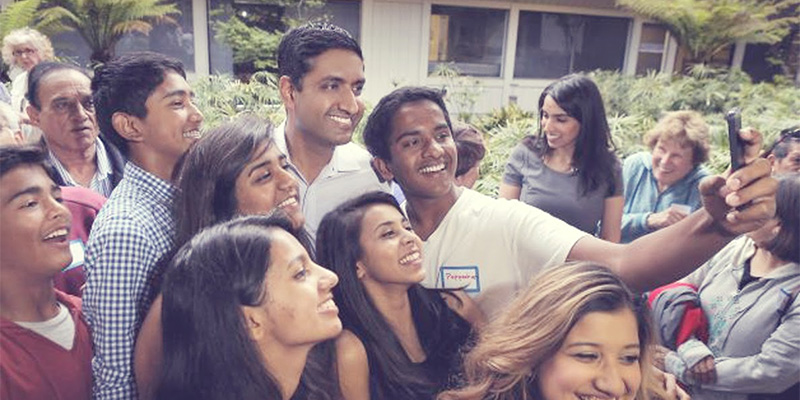
Our Constitution provides expansive protections for civil and religious liberties – they make America a beacon of hope for people around the world. As a child, my grandfather recounted stories of spending years in jail for the tremendous sacrifices he made to fight for human rights as part of Gandhi’s Independence Movement. To him and to my parents, who emigrated here from India, America represented a land of promise where they would be guaranteed dignity and freedom.
The ideals laid out by our Founding Fathers are clear: we all have unalienable rights to life, liberty, and the pursuit of happiness. In practice, however, making sure citizens are granted all the freedoms outlined in our Constitution has become increasingly complex in a technologically rich and interconnected world.
Promoting Freedom in the Age of Technology
The Founding Fathers recognized that citizens’ right to privacy over their “persons, houses, papers, and effects” is an essential component of democracy. Although they did not envision the advent of the Internet, the same protections should extend to our online activities. The reality is that our laws have lagged far behind our technological capabilities, resulting in widespread encroachment on our civil liberties.
To make matters worse, Congress has been asleep at the switch while the federal government has expanded the security state and private companies have run amok in storing and selling our data. With the revelations that the federal government is collecting warrantless metadata on American citizens, there has been growing bipartisan support for legislation to strengthen civil liberties.
Amend the PATRIOT Act and the Foreign Intelligence Act (FISA). According to FISA, the NSA must get surveillance warrants through the Federal Intelligence Surveillance Court (FISC). Some lawmakers allege that under FISA, the FISC has been issuing opinions that conflict with existing interpretations of the law, allowing the NSA to massively survey American citizens domestically – including reading emails and listening in on phone calls – without any connection to terrorism or national security.
Although some secrecy is necessary to ensure our intelligence and national security operations are effective, lawmakers and the American public need more oversight. The PATRIOT Act and FISA should be amended to require that interpretations used by the executive branch and FISC justify their operations by publicly disclosing them. While the actual opinions and operations should remain classified, it is essential that we have only one body of law instead of the current bifurcation.
Update Electronic Communications Privacy Act. The law, which protects the privacy of Americans’ electronic exchanges, including email, cell phone location records, Facebook posts, search history, and cloud computing documents, was passed in 1986. Such an outdated law – written before the World Wide Web even existed – cannot duly address the privacy issues we face in today’s technology heavy world.
Improve whistleblower protections. There have been more prosecutions under the Espionage Act in the past six years than in the previous 90. While a need exists for some intelligence activities to be kept classified, leaving whistleblowers unprotected and worse, aggressively prosecuting them, removes an effective and essential check on government abuse.
Although charging whistleblowers is under federal law enforcement authorities’ purview, there are also actions Congress can take. We should strengthen the First Amendment rights of whistleblowers and journalists reporting information in the public interest, and narrow the Espionage Act of 1917 to be more targeted toward actual acts of espionage and not leaks made to the press about abuses of power. Additionally, the whistleblower protections available to other federal employees should be extended to those within the intelligence community by improving the internal agency processes, clarifying the reporting mechanism to House and Senate Intelligence Committees, and providing individuals the right to challenge official retaliation in fair and impartial proceedings in federal court.
Defending Equality
Prevent racial profiling. When research shows that members of minorities are stopped more often by law enforcement officers than Caucasian individuals, it is essential that we increase our safeguarding of all individuals’ equal protection under the law. I strongly support the Racial Profiling Prevention Act currently in committee in the House of Representatives. The bill would direct the Secretary of Transportation to make grants to states that enact and enforce laws actively prohibiting state or local law enforcement officers from using race or ethnicity as a factor in law enforcement decisions.
Defend the right to practice religion. Freedom of religion is a basic founding principle of our nation. Unfortunately, almost every religious group has been the target of discrimination throughout our history. Today, with America more diverse than it has ever been, it is important to recognize that America is home to Christians, Jews, Sikhs, Muslims, Hindus, Buddhists, and other religious groups – and to treat all faiths with equal respect.
Most recently, Muslim and Hindu Americans have been subjugated for their religious beliefs and practices. In public schools Hinduism is presented in an overtly negative way and blamed for social evils. This kind of propagation of misinformation and myths is wrong and impacts the self-image of Hindu children. In order to instill a pride of all children in their heritage, I feel strongly that we must have a positive portrayal of Hindu culture and religion that is fact based.